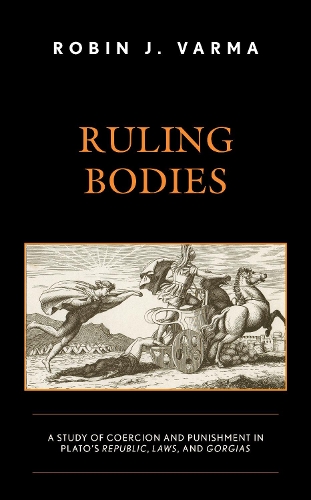
Ruling Bodies: A Study of Coercion and Punishment in Plato's Republic, Laws, and Gorgias
(Hardback)
Publishing Details
Ruling Bodies: A Study of Coercion and Punishment in Plato's Republic, Laws, and Gorgias
By (Author) Robin Varma
Bloomsbury Publishing PLC
Lexington Books/Fortress Academic
28th June 2022
United States
Classifications
Professional and Scholarly
Non Fiction
Social and political philosophy
Political science and theory
321.07
Physical Properties
Hardback
172
Width 159mm, Height 228mm, Spine 19mm
426g
Description
Ruling Bodies centers around an epochal ontological shift in ideas that changed the nature and the meaning of coercion in modern political thought. It begins with a review of Foucault, Arendt, and Habermas, and points out a discrepancy in the way each thinker understood coercion in modern politics. From here, Varma dives into the works of Plato to provide a framework and context for thinking about this. Through a detailed examination of the Republic, the Laws, and the Gorgias, Ruling Bodies offers us the first comprehensive account of coercion in Plato's thought. As the author shows, each dialogue is a demonstration of a particular style of Platonic statecraft that corresponds to the amount of power the philosopher holds in a city. The Republic demonstrates how a philosopher would rule as a monarch; the Laws demonstrates his rule when he must share power with other spirited oligarchs; and the Gorgias demonstrates his rule in a democracy where power belongs to the people. In all three dialogues, Varma argues that the philosopher's logos sought to bridge the passions of man with the heavenly bodies, and coercion was merely a supplementary tool to help achieve this end. When Hobbes recast the cosmos as matter, form, and power, however, the soul gets reduced to a material body, and the aim of logos was not to bridge the passions of man with the heavens, but to make the body obedient to power.
Reviews
A thought-provoking and exceptionally original exploration of the role of punishment and coercion in Platonic political theory and the limitations of rhetoric and education in shaping the characters of good citizens. Especially noteworthy is his interpretation of the Laws where he demonstrates that, contrary to the long-standing assumption that Plato had "come to his senses" in that work about the prospects of a perfect society where philosophy would rule, there is a very strong philosophic presence in the Athenian Strangers statecraft. By way of conclusion, he contrasts the Platonic approach to the role of coercion in political life with that of Hobbes, throwing the classical paradigm into sharp relief against a major exemplar of modern political thought. A must-read for everyone interested in Platonic political theory.
-- Waller Newell, Carleton UniversityWhat is the proper role of coercion and punishment in statecraft This work illuminates the question afresh by orchestrating a titanic debate: Platos account of penal legislation, in his political philosophy of statecraft as soulcraft, vs the accounts elaborated by three recent major political theoristsArendt, Habermas, and Foucault, with an inquiry back into their shared roots in Hobbes. The result is a deeply provocative perspective on the philosophy of crime and punishment.
-- Thomas L. Pangle, University of Texas at AustinAuthor Bio
Robin Varma is communications officer at Health Canada. He received his Ph.D. in political science from Carleton University.
